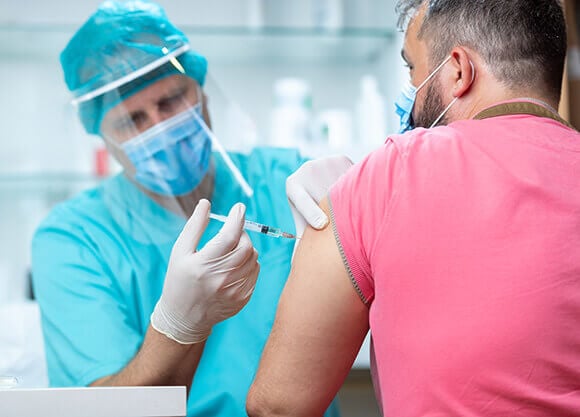
Interprofessional learning experience addresses the unique challenges of COVID-19
March 31, 2021

March 31, 2021

By creating the COVID-19 Interprofessional Learning Experience, the Quinnipiac University Center for Interprofessional Healthcare Education has risen to both challenges.
Originally presented in April 2020, the online IPE (interprofessional education) event once again will be offered to Quinnipiac students during the Spring 2021 semester. This year’s program will focus on health outcomes and health disparities among those most affected by COVID; having conversations with patients about the COVID-19 vaccine and possible viral resistance to it; and how to inform patients and the general public about getting vaccinated.
“This disease affects everybody, and no one person is more important than the other,” said Magdalena Lukaszewicz, professor of physician assistant studies and the IPE’s chief designer.
Lukaszewicz developed the IPE alongside Kim Hartmann, professor of occupational therapy and director of the Center for Interprofessional Healthcare Education. Significant contributions also came from faculty in the physical therapy, occupational therapy, athletic training and diagnostic imaging programs, and the School of Nursing and School of Medicine.
“These decisions involve all health care providers,” said Hartmann. “Everybody is responsible for reaching out to everybody else.”
The IPE tests decision-making in several ways. Case studies reveal everything from a patient’s symptoms, health history and X-rays, to their employment, living situation, and access to health and social resources. A polling feature allows participants to vote on the best clinical actions to take.
Last year’s IPE focused primarily on ethical issues surrounding the pandemic, including prioritization of care amid bed, resource and PPE shortages, and racial disparities with regards to infection and mortality rates. Content proved to be informative and eye-opening for participant and nursing student Tricia Varholak, DNP `22.
“I really appreciated the summarized updates regarding treatment,” said Varholak. “They helped me understand current outpatient treatment plans for patients.”
Since its launch, the IPE has drawn hundreds of eager students like Varholak from Quinnipiac's Schools of Health Sciences, Nursing and Medicine, and health care professionals from a wide range of disciplines in the community.
“The point is to bring participants together so they can think outside of their disciplines, and as members of a team,” Lukaszewicz said.
Breakout rooms spark meaningful discussions between students and professionals of all ages and experience levels, which often reveal the emerging roles of many care providers in the ICU.
For occupational therapy student Micaela Galley `19, MOT `21, hearing stories of OTs helping COVID-19 patients improve their physical mobility and mental health was inspiring.
“This pandemic has revealed the unique skills and adaptability of many different professions,” Galley said. “I feel very proud to be a part of a community that has demonstrated such resourcefulness.”
Data from each IPE session is collected to ensure that future versions are as up-to-date as possible. According to Lukaszewicz, even she learns something new every time.
“There's always an answer I didn't think of or some new idea that we can incorporate in the future,” she said. “Our goal is to stay current and allow even wider participation.”
In August, Lukaszewicz presented the IPE to a national audience at Nexus Summit 2020 alongside Kimberly Hartmann, occupational therapy; Barbara Glynn, nursing, and Kate Grevelding, physical therapy. The annual conference advances the study of interprofessional care models and generates new knowledge shared throughout the health care community. Other team members who were unable to attend the conference but contributed to the presentation included Tania Grgurich, diagnostic imaging; Matthew Mills, athletic training/physical therapy; and Julie Booth, physical therapy.
“It showed health care professionals and educators from around the country that not only should this content be taught right now,” Lukaszewicz said, "but that online, synchronous learning is viable and effective.”
The IPE will be held from 4-6 p.m. on February 18 and March 18.
Quinnipiac Today is your source for what's happening throughout #BobcatNation. Sign up for our weekly email newsletter to be among the first to know about news, events and members of our Bobcat family who are making a positive difference in our world.
Sign Up Now